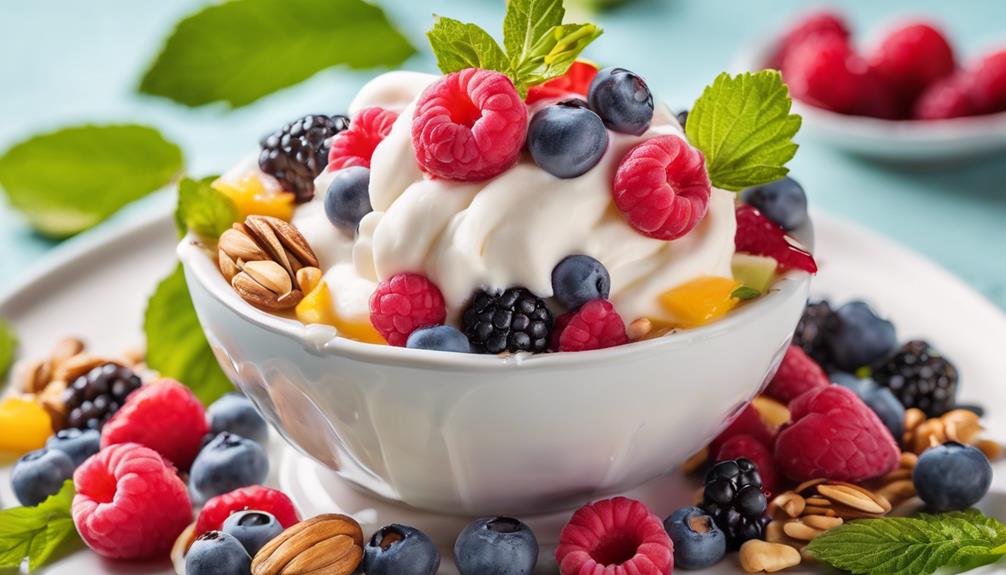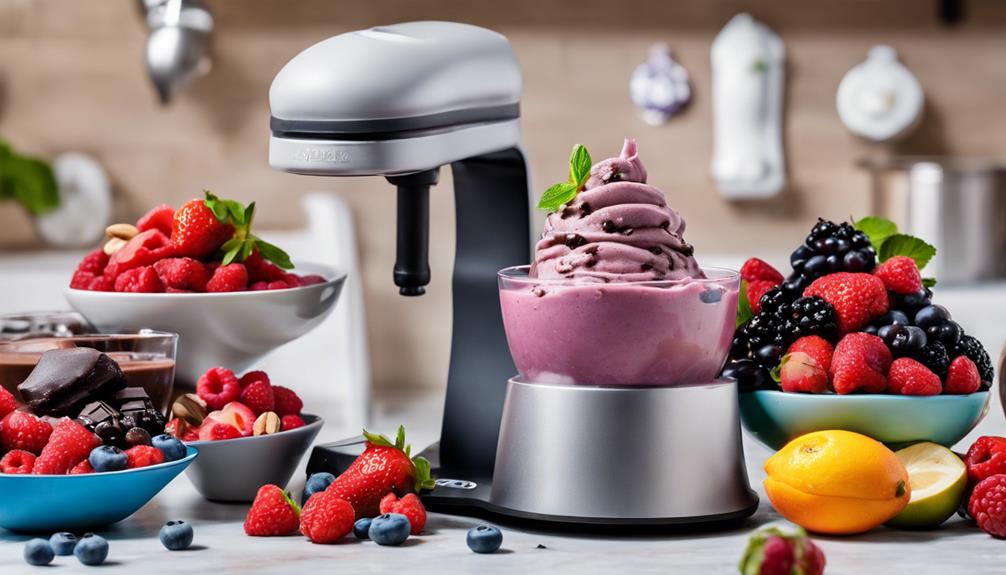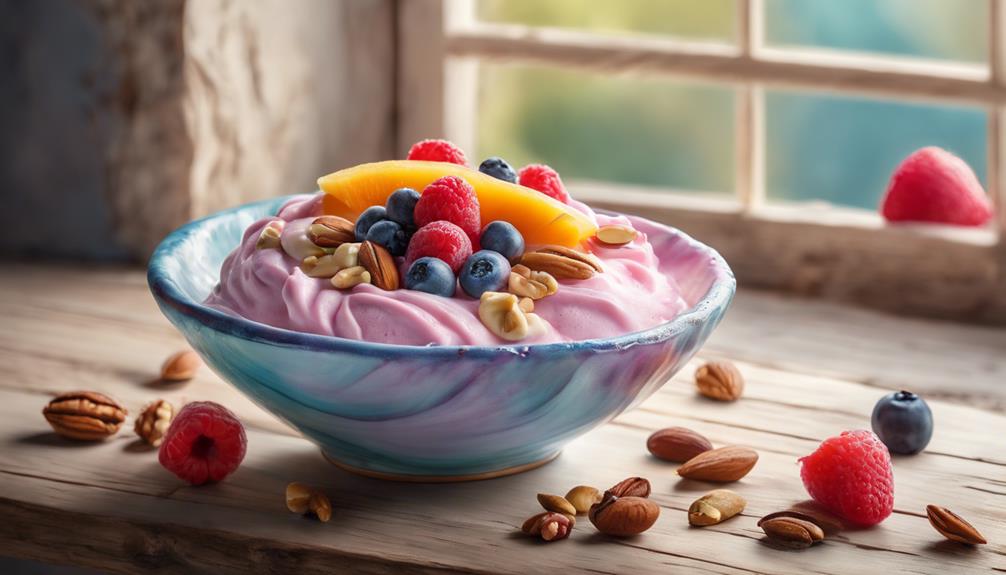Antioxidants in frozen yogurt, such as vitamins A, C, and E, along with flavonoids and polyphenols, offer a unique confluence of taste and health benefits. These compounds are essential in neutralizing free radicals, thereby mitigating oxidative stress and inflammation. Common inclusions like berries, dark chocolate, and nuts not only enhance flavor but also enrich the yogurt with potent antioxidants. With regular consumption, this delightful treat can support immune function and skin health. The subsequent sections will explore the specific benefits and sources of these antioxidants, as well as how to choose the best options for maximum health impact.
Key Takeaways
- Frozen yogurt contains antioxidants like vitamins A, C, and E, flavonoids, and polyphenols.
- Antioxidants in frozen yogurt combat oxidative stress and reduce inflammation.
- Berries, dark chocolate, and nuts are antioxidant-rich toppings for frozen yogurt.
- Vitamin C in frozen yogurt supports immune health and skin wellness.
- Tropical fruits in frozen yogurt offer vitamins and flavonoids that boost immunity and reduce inflammation.
What Are Antioxidants?

Antioxidants are compounds that neutralize harmful free radicals in the body, thereby reducing oxidative stress and inflammation. Free radicals are unstable molecules that arise from various metabolic processes and external sources like pollution and UV radiation. If left unchecked, these free radicals can damage cellular components, leading to oxidative stress, which is implicated in aging and various chronic diseases.
Antioxidants mitigate the detrimental effects of free radicals by donating electrons, thereby stabilizing these reactive molecules. This process helps in reducing oxidative stress and inflammation, two critical factors in maintaining cellular health and overall physiological balance. Common antioxidants include vitamins A, C, and E, as well as flavonoids and polyphenols, each of which plays a unique role in the antioxidant defense system.
In the context of dietary sources, frozen yogurt is an intriguing candidate due to its potential antioxidant content. The inclusion of fruits and nuts as toppings can further enhance the antioxidant profile of frozen yogurt, making it a more important choice for promoting health. Understanding the role and sources of antioxidants is essential for making informed dietary decisions aimed at minimizing oxidative stress and inflammation, ultimately contributing to better health outcomes.
Benefits of Antioxidants
The inclusion of antioxidants in frozen yogurt offers several health benefits, including boosting the immune system, combating free radicals, and enhancing skin health. These compounds protect cells from oxidative stress and environmental toxins, which can mitigate inflammation and reduce the signs of aging. Consequently, regular consumption of antioxidant-rich frozen yogurt can contribute greatly to overall well-being.
Boosts Immune System
Incorporating frozen yogurt rich in antioxidants into one's diet can greatly enhance the immune system by neutralizing harmful free radicals. Antioxidants, such as vitamin C, play an essential role in protecting the body's cells from oxidative stress, which can lead to chronic diseases. By mitigating the damage caused by free radicals, these antioxidants support immune function, reducing the risk of illnesses and promoting overall health.
Frozen yogurt, fortified with antioxidants, offers a delicious and nutritious way to bolster the immune system. Regular consumption of such fortified frozen yogurt can contribute to improved skin health, better digestion, and enhanced energy levels. Additionally, the presence of vitamin C in frozen yogurt not only supports immune health but also aids in collagen production, facilitating wound healing and maintaining the integrity of skin and tissues.
To further illustrate the benefits of antioxidants in frozen yogurt, consider the following table:
| Antioxidant | Benefit |
|---|---|
| Vitamin C | Supports immune function |
| Vitamin E | Protects against cell damage |
| Polyphenols | Reduces inflammation |
| Carotenoids | Promotes skin and eye health |
Including frozen yogurt rich in antioxidants as part of a balanced diet can promote longevity and overall vitality. This functional food not only satisfies sweet cravings but also serves as a practical approach to enhancing immune resilience.
Fights Free Radicals
Building upon the immune-boosting properties of antioxidants in frozen yogurt, these potent compounds also play a significant role in fighting free radicals, thereby reducing oxidative stress throughout the body. Free radicals are unstable molecules that can cause cellular damage, leading to oxidative stress—a condition linked to the development of various chronic diseases. The inclusion of antioxidants in frozen yogurt, such as vitamins A, C, and E, helps neutralize these harmful molecules.
Scientific studies suggest that a diet rich in antioxidants can lower the risk of chronic diseases, including heart disease and certain types of cancer. By mitigating oxidative stress, antioxidants support cellular health and function, contributing to overall well-being. The incorporation of fruits like berries and nuts into frozen yogurt further amplifies its antioxidant content, providing an additional layer of protection against free radicals.
Regular consumption of antioxidant-rich frozen yogurt can, thus, be a delicious and practical strategy for enhancing one's dietary defense against oxidative stress. This not only helps in maintaining cellular integrity but also offers a proactive approach to reducing the risk of chronic diseases, thereby promoting long-term health and wellness.
Enhances Skin Health
How do antioxidants in frozen yogurt contribute to enhanced skin health and protection against environmental stressors? Antioxidants play a pivotal role in combating oxidative stress and neutralizing free radicals, which are detrimental to skin health. Regular consumption of antioxidant-rich frozen yogurt can greatly improve skin tone and texture by reducing the damage caused by these unstable molecules.
Oxidative stress, a condition characterized by an imbalance between free radicals and antioxidants, accelerates skin aging and promotes the development of fine lines, wrinkles, and dullness. Frozen yogurt, enriched with antioxidants such as Vitamin C and Vitamin E, provides a robust defense mechanism against this phenomenon. Vitamin C, known for its skin-brightening properties, enhances skin elasticity and supports collagen synthesis, while Vitamin E aids in maintaining skin firmness and hydration.
Moreover, antioxidants present in frozen yogurt can protect the skin from harmful UV radiation, a major environmental stressor responsible for premature aging and skin damage. By incorporating frozen yogurt into your diet, you not only enjoy its delectable taste but also support a radiant and youthful complexion. Therefore, the antioxidants in frozen yogurt present a dual advantage: they boost skin health and offer protection against environmental aggressors.
Antioxidants in Frozen Yogurt

Frozen yogurt, particularly when enhanced with fruits like berries and toppings such as dark chocolate, can serve as an important source of antioxidants that combat oxidative stress and inflammation. Antioxidants are compounds that inhibit oxidation, a chemical reaction that can produce free radicals, thereby leading to cellular damage. Incorporating antioxidant-rich fruits and toppings into frozen yogurt can greatly elevate its health benefits.
Berries, known for their high antioxidant content, contribute essential compounds such as flavonoids and vitamin C, which have been shown to reduce markers of inflammation. Dark chocolate, another powerful antioxidant source, contains polyphenols and flavonoids, which help neutralize free radicals and promote overall wellness. By choosing frozen yogurt with these components, individuals can enjoy a delicious treat while supporting their body's antioxidant defenses.
Furthermore, the inclusion of these antioxidant-laden ingredients can mitigate oxidative stress, a condition linked to chronic diseases such as cardiovascular disease and diabetes. The antioxidative properties of dark-colored fruits and dark chocolate toppings in frozen yogurt not only enhance its flavor profile but also its nutritional value, making it a beneficial addition to a balanced diet. Frozen yogurt serves as a dual-purpose indulgence, offering both taste and health benefits.
Best Fruits for Antioxidants
When considering the best fruits to enhance the antioxidant content of frozen yogurt, berries such as blueberries, raspberries, and blackberries stand out due to their high levels of polyphenols, ellagic acid, and anthocyanins, all of which contribute to significant health benefits. Additionally, tropical fruits like pomegranate and acai berries offer potent antioxidants such as punicalagins and flavonoids, which support heart health and reduce oxidative stress. Incorporating these fruits into frozen yogurt not only boosts its nutritional profile but also enhances its health-promoting properties.
Berries' Nutrient Powerhouses
Berries, including blueberries, strawberries, and raspberries, are nutrient powerhouses rich in antioxidants that help protect cells from damage and support overall health. These small fruits are packed with compounds that can reduce inflammation, lower oxidative stress, and contribute to overall well-being.
Blueberries, for instance, contain high levels of anthocyanins, a type of antioxidant linked to numerous health benefits, including improved cognitive function and cardiovascular health. The rich blue hue of blueberries is a demonstration of their potent anthocyanin content, making them one of the best options for boosting antioxidant intake.
Strawberries, on the other hand, are abundant in vitamin C, manganese, and other antioxidants that are essential for skin health and immune function. The vibrant red color of strawberries indicates their high antioxidant levels, particularly beneficial for combating free radicals.
Raspberries offer a robust source of ellagic acid, a compound renowned for its antioxidant and anti-inflammatory properties. This makes raspberries an excellent choice for those looking to reduce inflammation and support cellular health.
Incorporating these berries into frozen yogurt not only enhances flavor but also enhances its nutritional profile, providing a delicious and healthful treat.
Tropical Fruits Benefits
Incorporating tropical fruits like pineapple, mango, and papaya into your diet can greatly enhance your antioxidant intake, providing numerous health benefits. These tropical fruits are rich sources of vitamins A, C, and E, as well as powerful compounds such as carotenoids and flavonoids. These antioxidants help combat inflammation and oxidative stress, which are key contributors to chronic diseases.
The benefits of including tropical fruits in your diet are manifold:
- Boosted Immunity: Antioxidants like vitamin C found in mangoes and pineapples enhance immune function, helping the body defend against infections and illnesses.
- Reduced Inflammation: Papaya contains papain, an enzyme that helps reduce inflammation, potentially alleviating symptoms of inflammatory conditions such as arthritis.
- Skin Health: The high antioxidant content in these fruits aids in protecting skin cells from damage caused by free radicals, promoting healthier, radiant skin.
- Chronic Disease Prevention: Regular consumption of these antioxidant-rich tropical fruits can lower the risk of chronic diseases, including heart disease and cancer, by safeguarding cellular integrity.
Including a colorful assortment of tropical fruits in your frozen yogurt not only elevates the flavor but also guarantees a delicious, health-boosting treat.
Making Antioxidant-Rich Frozen Yogurt

Therefore, creating antioxidant-rich frozen yogurt can be achieved by incorporating fruits such as berries, dark chocolate, and nuts, which are abundant in health-promoting compounds like vitamin C, anthocyanins, flavonoids, and polyphenols. Berries like blueberries, strawberries, and raspberries are particularly effective due to their high levels of vitamin C and anthocyanins, which have been shown to combat oxidative stress and inflammation.
Dark chocolate, rich in flavonoids, contributes not only a decadent flavor but also heart health benefits by improving blood flow and reducing blood pressure. Nuts such as almonds and walnuts introduce polyphenols, which have anti-inflammatory properties and support cardiovascular health.
The combination of these ingredients in frozen yogurt offers a multifaceted approach to enhancing overall health. The antioxidants present can support skin health by neutralizing free radicals and promoting collagen production, which helps maintain skin elasticity and reduces signs of aging. Additionally, regular consumption of antioxidant-rich frozen yogurt can protect against chronic diseases by mitigating oxidative damage at the cellular level. Making antioxidant-rich frozen yogurt is a delicious way to incorporate beneficial nutrients into one's diet, promoting overall well-being.
Comparing Frozen Yogurt Brands
When comparing frozen yogurt brands, it is essential to evaluate the variations in live probiotic cultures, antioxidant content, and the quality of ingredients used to determine their overall health benefits. Different brands may offer diverse levels of live cultures, which are important for the probiotic benefits that support gut health. Additionally, the antioxidant content in frozen yogurt can vary depending on the specific ingredients and the variety of fruits, nuts, and toppings included.
To make an informed choice, consider the following key factors:
- Live Probiotic Cultures: Brands that include a higher amount of live cultures can provide better probiotic benefits, enhancing digestive health and immune response.
- Antioxidant Content: Evaluate the types and quantities of fruits and nuts used, as these contribute to the antioxidant properties, which help combat oxidative stress.
- Quality of Ingredients: High-quality, natural ingredients without artificial additives can enhance both the nutritional value and overall health benefits of the frozen yogurt.
- Nutritional Profile: Look for brands that offer a balanced profile of vitamins and minerals, which can further contribute to the antioxidant content and overall nutritional value.
Frequently Asked Questions
Is Frozen Yogurt Actually Healthy?
Frozen yogurt can be a healthy option due to its lower calorie content and beneficial probiotics. However, sugar levels, artificial flavors, and portion control are important aspects to keep in mind when evaluating its overall health benefits.
Does Frozen Yogurt Have Beneficial Bacteria?
Yes, frozen yogurt contains beneficial bacteria known as probiotics. These bacterial cultures support gut health, serve as a digestive aid, and are indicated by the Live and Active Cultures seal, confirming their presence in the product.
What Kind of Frozen Yogurt Is Healthiest?
The healthiest frozen yogurt option is Greek, with low sugar content, high protein, and live probiotic cultures. Prioritize ingredient quality, opt for flavor varieties with minimal additives, and manage portion size to maintain a balanced diet.
What Are the Benefits of Freezing Yogurt?
Freezing yogurt is like sealing a time capsule; it enhances texture improvement, extends shelf life, and acts as a natural preservative. This process guarantees nutrient retention, maintaining its health benefits for a longer period.
Conclusion
To sum up, the incorporation of antioxidants in frozen yogurt goes beyond mere dietary indulgence, offering a unique blend of delicious taste and powerful health benefits. The vitamins, flavonoids, and polyphenols found in antioxidant-rich ingredients such as berries and dark chocolate not only neutralize harmful free radicals but also promote glowing skin and strong immunity. Regular consumption of such frozen yogurt can be seen as an exceptional dietary intervention, combining pleasure with significant wellness advantages.







